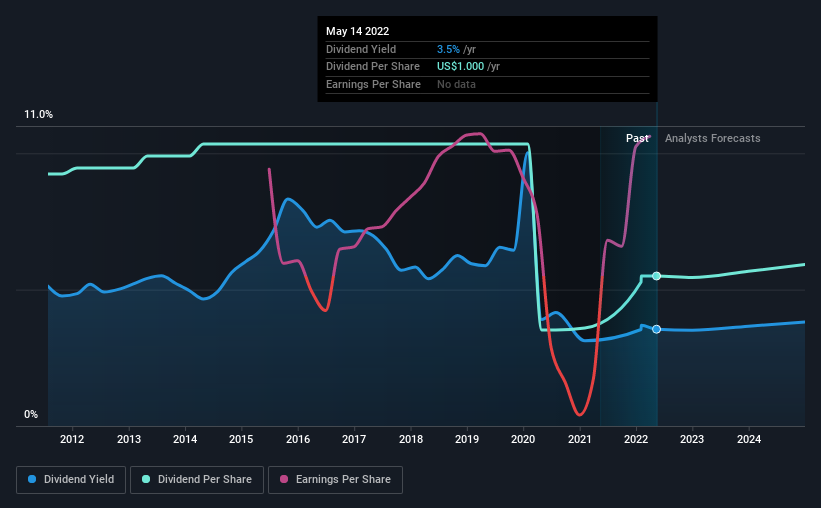Here's What We Like About Shell's (LON:SHEL) Upcoming Dividend
It looks like Shell plc (LON:SHEL) is about to go ex-dividend in the next 3 days. Typically, the ex-dividend date is one business day before the record date which is the date on which a company determines the shareholders eligible to receive a dividend. The ex-dividend date is of consequence because whenever a stock is bought or sold, the trade takes at least two business day to settle. Meaning, you will need to purchase Shell's shares before the 19th of May to receive the dividend, which will be paid on the 27th of June.
The company's next dividend payment will be US$0.25 per share, on the back of last year when the company paid a total of US$1.00 to shareholders. Looking at the last 12 months of distributions, Shell has a trailing yield of approximately 3.5% on its current stock price of £23.035. Dividends are a major contributor to investment returns for long term holders, but only if the dividend continues to be paid. That's why we should always check whether the dividend payments appear sustainable, and if the company is growing.
Check out our latest analysis for Shell
Dividends are usually paid out of company profits, so if a company pays out more than it earned then its dividend is usually at greater risk of being cut. That's why it's good to see Shell paying out a modest 35% of its earnings. Yet cash flow is typically more important than profit for assessing dividend sustainability, so we should always check if the company generated enough cash to afford its dividend. It paid out 21% of its free cash flow as dividends last year, which is conservatively low.
It's positive to see that Shell's dividend is covered by both profits and cash flow, since this is generally a sign that the dividend is sustainable, and a lower payout ratio usually suggests a greater margin of safety before the dividend gets cut.
Click here to see the company's payout ratio, plus analyst estimates of its future dividends.
Have Earnings And Dividends Been Growing?
Companies with consistently growing earnings per share generally make the best dividend stocks, as they usually find it easier to grow dividends per share. If earnings fall far enough, the company could be forced to cut its dividend. It's encouraging to see Shell has grown its earnings rapidly, up 38% a year for the past five years. Earnings per share have been growing very quickly, and the company is paying out a relatively low percentage of its profit and cash flow. This is a very favourable combination that can often lead to the dividend multiplying over the long term, if earnings grow and the company pays out a higher percentage of its earnings.
The main way most investors will assess a company's dividend prospects is by checking the historical rate of dividend growth. Shell has seen its dividend decline 5.1% per annum on average over the past 10 years, which is not great to see. Shell is a rare case where dividends have been decreasing at the same time as earnings per share have been improving. It's unusual to see, and could point to unstable conditions in the core business, or more rarely an intensified focus on reinvesting profits.
The Bottom Line
Is Shell worth buying for its dividend? It's great that Shell is growing earnings per share while simultaneously paying out a low percentage of both its earnings and cash flow. It's disappointing to see the dividend has been cut at least once in the past, but as things stand now, the low payout ratio suggests a conservative approach to dividends, which we like. Shell looks solid on this analysis overall, and we'd definitely consider investigating it more closely.
On that note, you'll want to research what risks Shell is facing. For example, we've found 2 warning signs for Shell (1 makes us a bit uncomfortable!) that deserve your attention before investing in the shares.
Generally, we wouldn't recommend just buying the first dividend stock you see. Here's a curated list of interesting stocks that are strong dividend payers.
Have feedback on this article? Concerned about the content? Get in touch with us directly. Alternatively, email editorial-team (at) simplywallst.com.
This article by Simply Wall St is general in nature. We provide commentary based on historical data and analyst forecasts only using an unbiased methodology and our articles are not intended to be financial advice. It does not constitute a recommendation to buy or sell any stock, and does not take account of your objectives, or your financial situation. We aim to bring you long-term focused analysis driven by fundamental data. Note that our analysis may not factor in the latest price-sensitive company announcements or qualitative material. Simply Wall St has no position in any stocks mentioned.

 Yahoo News
Yahoo News 

